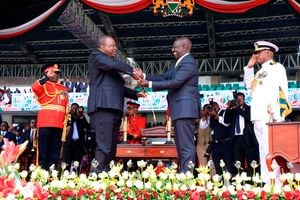
Meru Governor Kawira Mwangaza speaks to the media outside Milimani Law Courts in Nairobi after the court extended orders suspending her impeachment on December 18, 2024.
The impeachment of Governors Kawira Mwangaza and Erick Kimutai by members of county assembly (MCAs) this year was yet another case of perennial turf wars in counties that continue to hamper service delivery.
While Governor Kimutai (Kericho) was saved by the Senate, his counterpart is still hanging onto her position by a thread thanks to a court order after senators confirmed her removal from office by impeachment by Meru MCAs.
The supremacy battles are, however, not limited to only governors and the MCAs but have also spilled to MCAs against county executive committee members as well as between the county bosses and their deputies.
The latter battle saw Kisii deputy governor Robert Monda removed from office by impeachment last year after falling out with his boss, Governor Simba Arati.
In Siaya, Deputy Governor William Oduol is said to be the second in command in the county just on paper as he no longer sees eye-to-eye with Governor James Orengo.
The deputy governor survived removal from office in 2023 following his impeachment by Siaya County Assembly after senators dismissed the attempt by the MCAs.
However, Mr Oduol told a Senate committee in May 2024 that his working relationship with Governor Orengo has worsened since then.
Appearing before the Senate Devolution committee, he narrated how he continues to face frustration from his boss, preventing him from executing his duties.
The Senate Devolution committee is handling 21 cases of bad blood between governors and their deputies, lifting the lid on the uneasy relationship between the two top county officers.
The turf wars have also pitted the MCAs against county executive committee members who are no longer at ease as they face hostility from the county legislators.
In the North Rift region, for instance, multi-million-shilling development projects in some counties are at risk of stalling due to the supremacy battles.
Some of the affected counties include Trans Nzoia and Nandi where five executives are facing the sack or have resigned due to relentless power struggle between the county assembly and the Executive, leaving service delivery hanging in the balance.
The hostile ward representatives have accused the county ministers of incompetence and mismanagement of funds meant for implementation of various development projects in the devolved units.
In Governor George Natembeya’s administration, the county boss is under pressure from MCAs to sack County Secretary Truphosa Amere, Lands CEC Janerose Mutama and her Sports and Tourism counterpart Stanley Kirui following approval of a motion to remove the officers from office.
The Trans Nzoia County Assembly approved the motion to dismiss the trio despite a court order restraining the MCAs from doing so.
Ms Mutama is accused of failing to properly advise Governor Natembeya on the ongoing construction of the county headquarters on land disputed by a private developer.
On the other hand, Ms Amere was accused of wrongly advising the governor on the transfer of medical services from Kitale County Hospital to Wamalwa Kijana Teaching and Referral Hospital, a move the MCAs said circumvented due process.
In Nandi County, an ad-hoc committee of the county assembly to investigate the county’s infrastructural and financial status recommended the sacking of all county executives and heads of critical departments over alleged mismanagement of public funds.
Although the report flopped before the assembly, two county ministers – Health CEC Ruth Koech and her Roads counterpart Doris Rono – resigned in the aftermath with Governor Stephen Sang forced to reshuffle his Cabinet.
In Bomet County, Governor Hillary Barchok was forced to suspend three CECs as part of a truce to end a standoff with MCAs.
Facing impeachment, together with his entire Cabinet, the county boss had to call for an urgent meeting with the ward representatives to iron out their differences.
The tug of war lasted more than a month and resulted in derailment of service delivery as the MCAs proceeded with impeachment motions against three CECs.
County Assemblies Forum Secretary-General Chege Mwaura agrees that the fights do affect service delivery in a big way because whenever there is a fight about a certain issue, if it is a project, it has to stop until the differences are resolved.
He says that the turf wars are usually about resources most of the time or disagreement on how to allocate certain projects.
“The fights are usually politically-motivated. In Meru it was about allocation of ward development fund and how the MCAs were to be involved in the process,” says the Ngara Ward MCA.
“It is a big conversation that people need to find a way of managing as governance is a continuous process,” he adds.
Makueni Governor Mutula Kilonzo Junior avers that a county government is structured as an entity with two arms and whenever there is a disagreement between the two, challenges abound affecting service delivery.
He explains that there is nothing a governor can do without the authority from the county assembly and when the fights exist, the county bosses become hostages resulting in stalling of development and other services.
The first term governor argues that the fights are mostly political but are also driven by disagreements in resource allocation and lack of autonomy of the assembly.
“We need to find a formula to ensure assemblies are completely independent and are not at the whims of a governor and also make sure governors don’t become a hostage to the MCAs,” Governor Kilonzo explains.
“We need to ring fence ward development fund to balance between the wards in terms of development. That is what we have done in Makueni and it is working,” he adds.
In 2023, Nairobi Governor Johnson Sakaja was embroiled in bitter tussles with MCAs that threatened service delivery.
Fearing for the worse, the governor organised a two-day retreat in Naivasha with the ward representatives to address the issues that had been bedeviling the county.
Nairobi County Assembly Minority Whip Mark Mugambi said the retreat was organised following fears that any future disputes will likely stall county service delivery.
“Unless the pressing issues are urgently resolved, Sakaja will not experience a plain sailing term in office. Such a situation could jeopardise service delivery in the county,” said the Umoja I MCA.
Frosty relationships in county leadership, however, are not a new phenomenon with the never-ending political bickering fueled by undercurrents and blackmail.
Governor Mwangaza, for instance, has undergone baptism of fire facing the senate three times out of five impeachment motions brought against her in only two years of leading Meru County.
At the heart of the power struggles has been failure to implement pre-election pacts, including sharing of key appointments and succession politics.
At the height of their fallout with his boss, Kericho Deputy Governor Fred Kirui accused his boss of reneging on a pre-election deal on sharing of county appointments leading to a bitter feud.
Mr Kirui claimed the two had agreed on sharing of appointments on a 60:40 basis but as soon as they took the oath of office, the gentleman's agreement was thrown out of the window.
He accused the governor of failing to stick to his side of the agreement and sidelining him in the management of the county affairs.
“During our discussions, we signed an agreement that when we win elections, we would form the government together. He was expected to take care of 60 percent as I remained with 40 percent, the agreement is before a commissioner of oaths. However, I got zero shares,” said Mr Kirui.
But the Kericho agreement appears not to have been an isolated case with Trans Nzoia Deputy Governor Philomena Kapkory also accusing Governor George Natembeya of going back on a pre-poll deal leading to bad blood between the two.
“I remember I was to get 30 percent in terms of government sharing, but he never gave me even one position. I've never even employed a cat in Trans Nzoia County,” said the DG.
“When I inquired, he told me that my community and the larger Kalenjin did not vote for him the way he expected despite getting 18,000 votes from the Sabaots,” she added.









